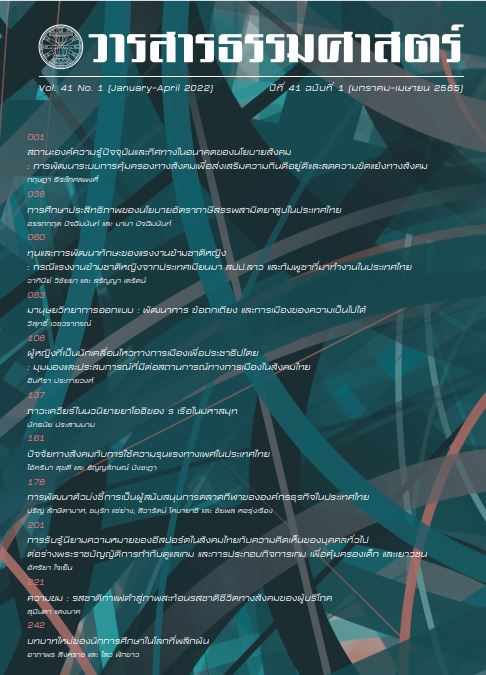Bitterness: The Taste of Black Coffee to the Taste of Social Life of Consumers
Main Article Content
Abstract
The purpose of this article is to better understand the social experiences that adult consumers of black coffee share among each other. Economic, educational, cultural, and religious traditions and beliefs are used to frame reflections on society's structure. Using
methods of research from relevant documents and studies, In-depth interviews, both face-toface and via online platform, were used to collect field data. Non-participant observation methods are also used. Furthermore, the authors chose to study only adults in the black coffee consumer groups, which included young and middle-aged adults. They also consume black coffee in a way that can be characterized as "a part of their daily life," with four females and six males ranging in age from 21 to 48 years old. Actually, adulthood is the longest period of a person's life; that is, adulthood is the age at which one reaches the highest level of coffee consumption. A field of study is the context of current Thai society in the form of an urban society with social and cultural changes. It is a phenomenon that has an impact on lifestyle, behavior, and health. From daily life, education, work, competitive environments, and driving in heavy traffic. That is, adulthood has life experiences that must be met in stages and on a set schedule. As a result, black coffee is the favorite type of coffee among consumers. Because of the high caffeine content as well as the convenience of consumption. The article suggests that people drink black coffee on a daily basis. Aside from being a habit that had developed up until that point, the individual has a role in social obligations that cannot be ignored. So, in order to connect themselves to social frameworks such as achieving success in life and having a good quality of life, a helper such as black coffee is actually needed.
Article Details
References
ฐิติรัตน์ รุ่งหิรัญศักดิ์. (2557). ปัจจัยที่มีอิทธิพลต่อการบริโภคกาแฟของผู้บริโภคในกรมสนับสนุนบริการสุขภาพ (ส่วนกลาง) (วิทยานิพนธ์เศรษฐศาสตรมหาบัณฑิต สาขาวิชาเศรษฐศาสตร์). คณะเศรษฐศาสตร์, มหาวิทยาลัยธุรกิจบัณฑิตย์.
พรภิมล ปานดี. (2557). คุณภาพชีวิตการทำงานของบุคลากรสำนักงานยุติธรรมจังหวัดฉะเชิงเทรา (วิทยานิพนธ์รัฐประศาสนศาสตรมหาบัณฑิต สาขาวิชาบริหารงานทั่วไป). วิทยาลัยการบริหารรัฐกิจมหาวิทยาลัยบูรพา.
พระราชบัญญัติการศึกษาภาคบังคับ พ.ศ. 2545, มาตรา 1.
พระราชบัญญัติการศึกษาภาคบังคับ พ.ศ. 2545, มาตรา 4.
ภรภัทร เอกจีรภัทร. (2551). การศึกษาพฤติกรรมการบริโภคกาแฟในเขตกรุงเทพฯ (สารนิพนธ์ ปริญญาเศรษฐศาสตรมหาบัณฑิต). มหาวิทยาลัยรามคำแหง.
สุมินตา แดงนาค. (2564). ความขม: รสชาติกาแฟดำสู่ภาพสะท้อนรสชาติชีวิตทางสังคมของผู้บริโภค (การศึกษาแบบรายบุคคลสังคมวิทยาและมานุษยวิทยาบัณฑิต).สาขาวิชาสังคม วิทยาและมานุษยวิทยา, มหาวิทยาลัยธรรมศาสตร์.
อภิราม คำสด และ สาธิต อดิตโต. (2559). พฤติกรรมการบริโภคกาแฟสดของนักศึกษาใน มหาวิทยาลัยขอนแก่น. วารสารวิทยาลัยบัณฑิตศึกษาการจัดการมหาวิทยาลัยขอนแก่น
Hall, S. (2001). Foucault: Power, Knowledge and Discouse. In Discouse Theory and Practice. London. Thousand Oaks and New Delhi: SAGE Publications.
ตั้ง (นามสมมติ). (7 เมษายน 2564). สัมภาษณ์
บิ๊ก (นามสมมติ). (13 เมษายน 2564). สัมภาษณ์
เหมียว (นามสมมติ). (13 เมษายน 2564). สัมภาษณ์
แหม่ม (นามสมมติ). (17 เมษายน2564). สัมภาษณ์
แป๊ะ (นามสมมติ). (18 เมษายน 2564). สัมภาษณ์
แอน (นามสมมติ). (18 เมษายน 2564). สัมภาษณ์

